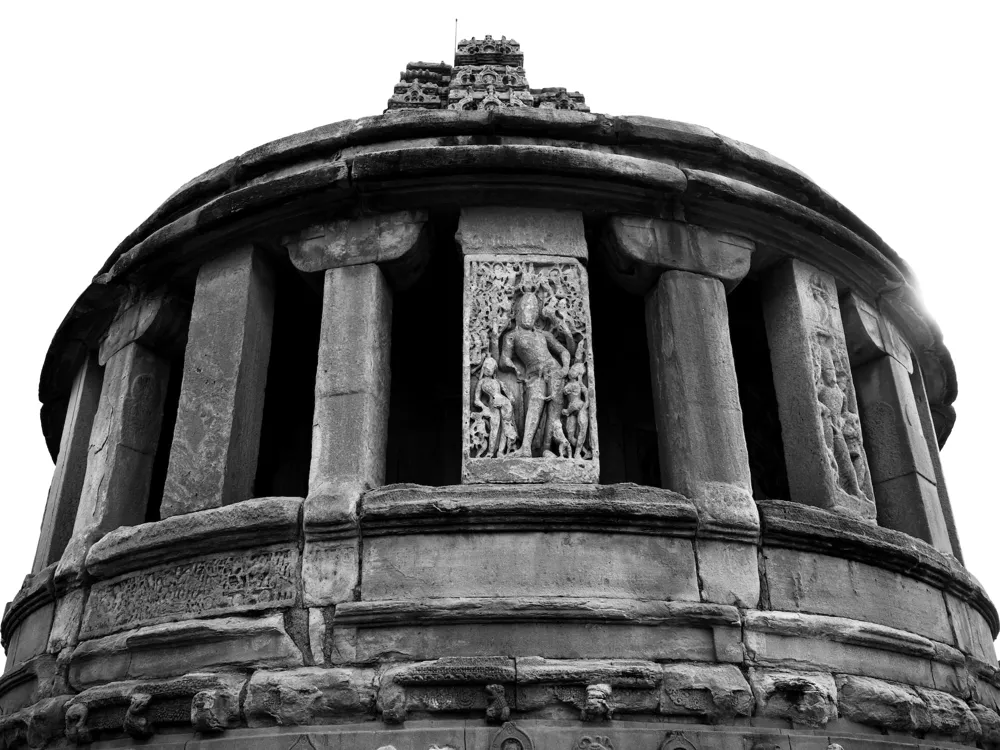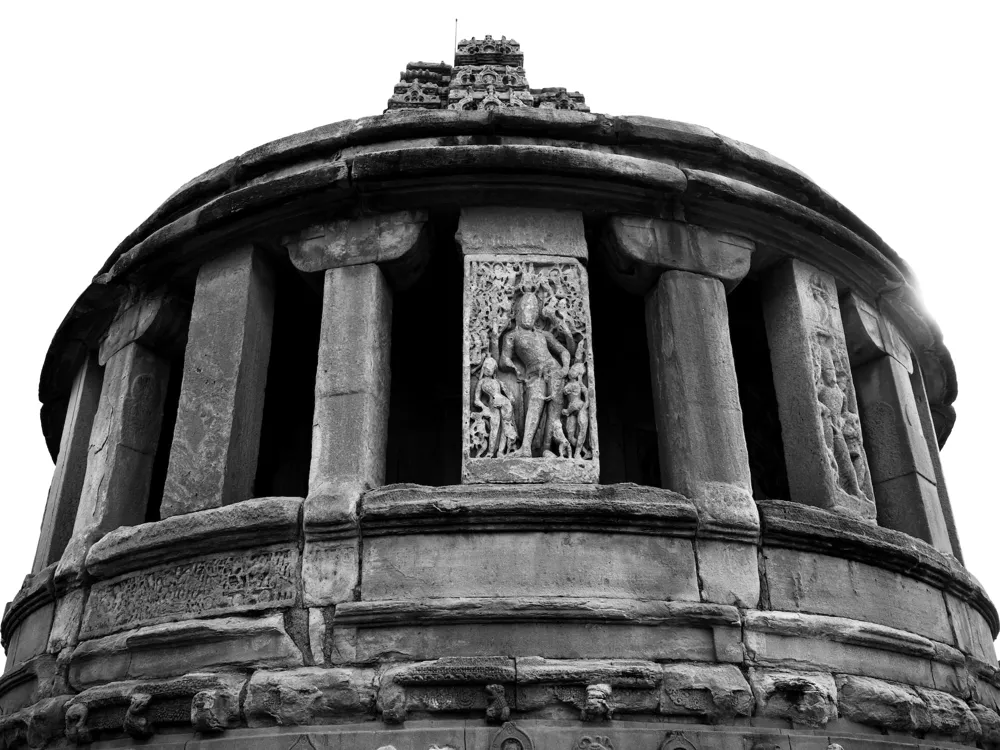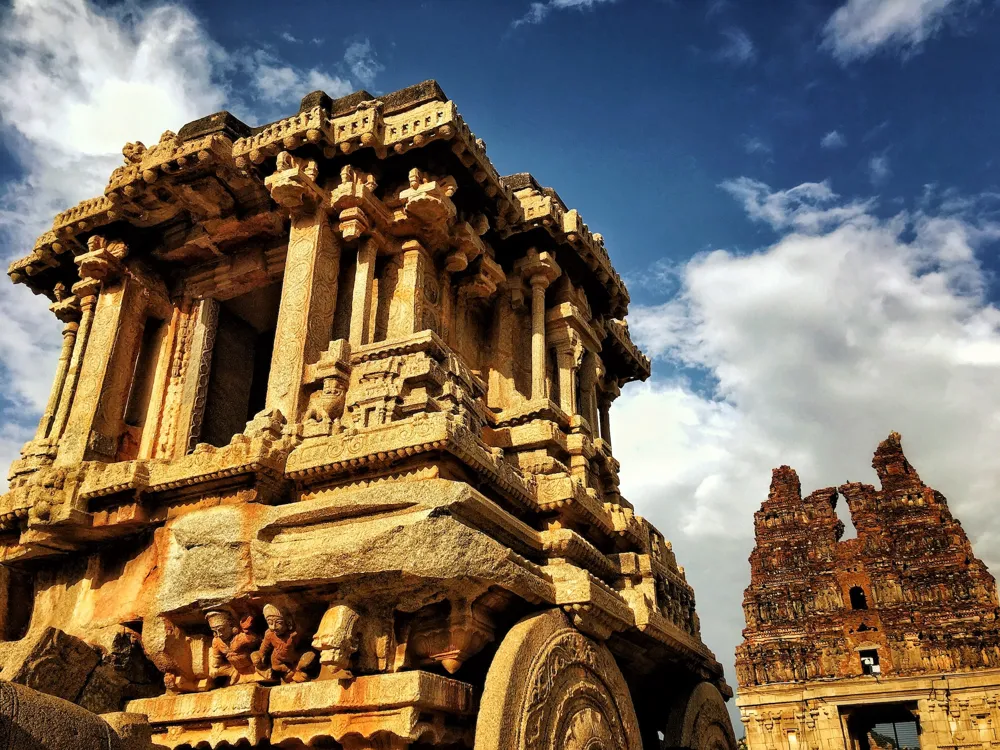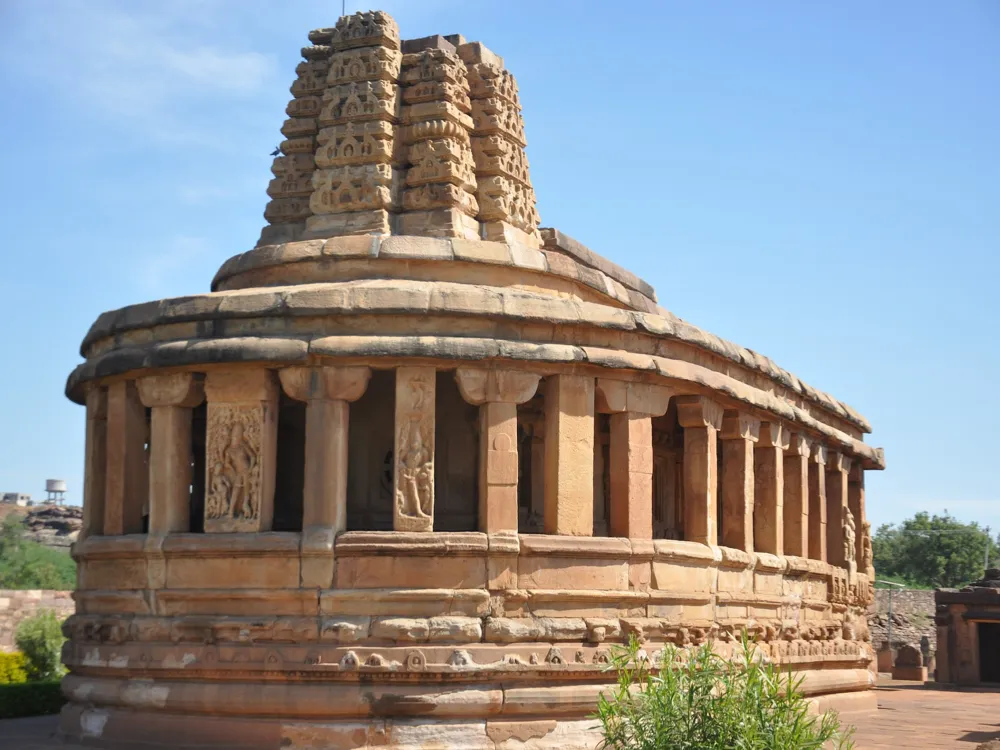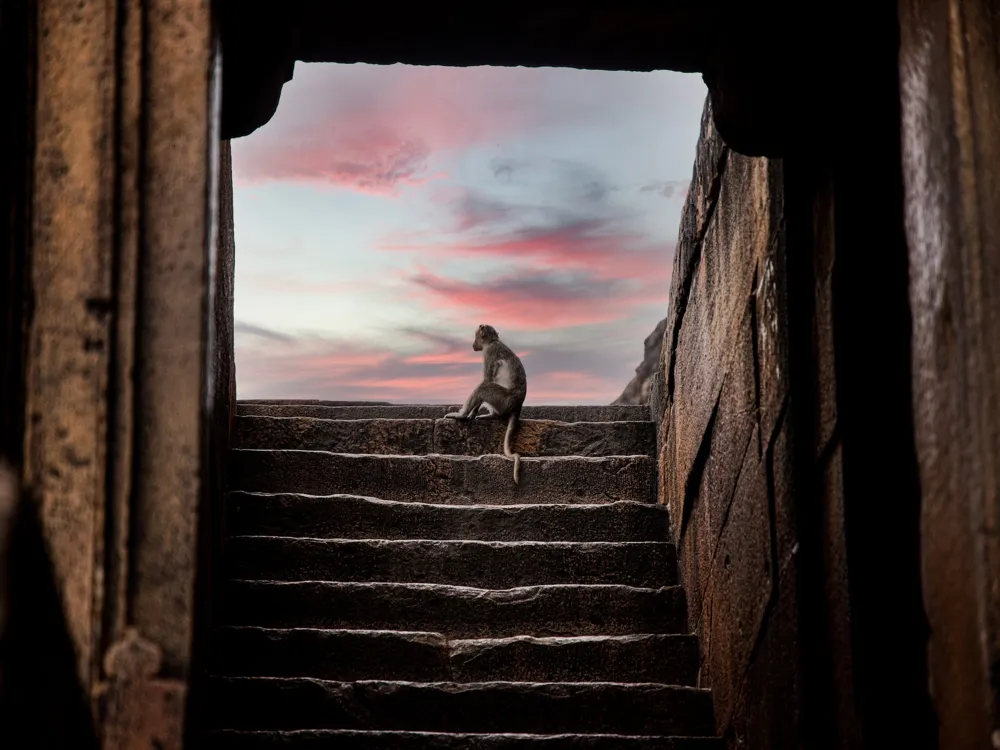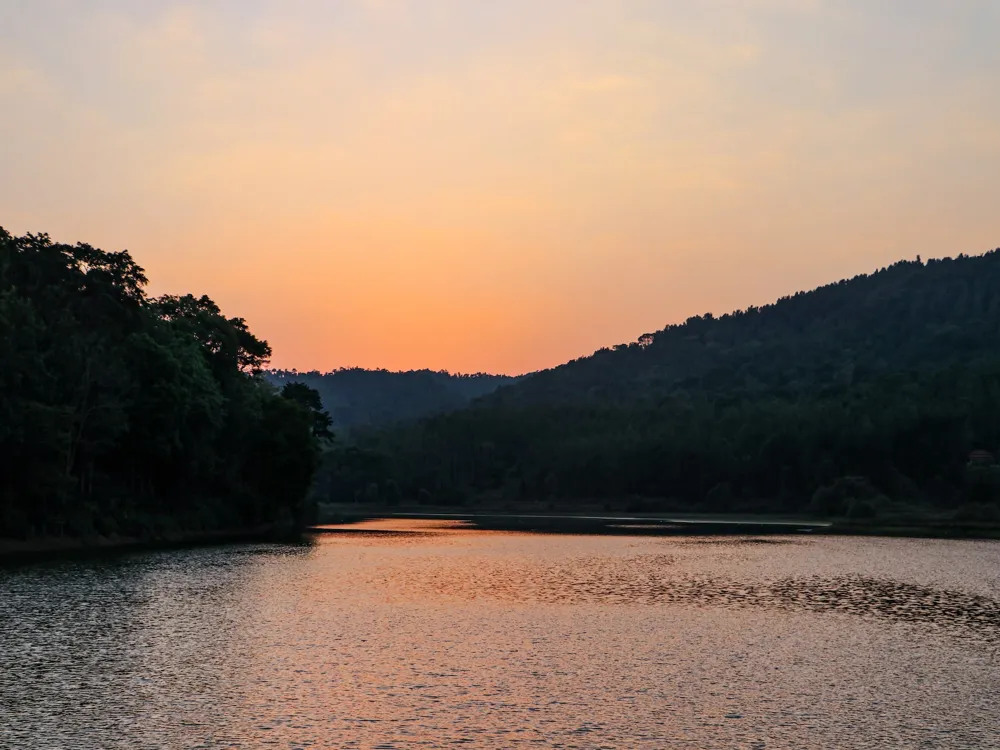The Lad Khan Temple, nestled in the historic town of Aihole in Karnataka, India, is a remarkable testament to ancient Indian architecture. This temple, dating back to the 5th century, is part of the Aihole temple complex, which is often referred to as the cradle of Hindu rock architecture. The name 'Lad Khan' is derived from a Muslim general who used the temple as his residence for a period. This historical monument stands out for its unique architectural style and the historical significance embedded within its walls. The temple's architecture is a fascinating blend of various historical influences. It is predominantly constructed in the Panchayatana style, a significant feature of early Chalukyan design. The temple's base is elevated, and the structure comprises a main shrine (Garbhagriha) and a front porch (Mandapa). Intricate carvings depicting various Hindu deities and mythological scenes adorn the temple walls, presenting a visual treat to visitors and historians alike. The stone carvings in the Lad Khan Temple reflect the craftsmanship and the artistic prowess of the artisans of that era. The temple's historical significance is immense, as it marks the beginning of temple architecture in South India. The Lad Khan Temple is not just a religious site; it's a symbol of the cultural and architectural heritage of India. The evolution of temple architecture can be traced back to this temple, making it a critical study point for historians and architects worldwide. The architecture of the Lad Khan Temple is a subject of great interest among historians and architects. The structure is built in a Panchayatana style, which is characterized by a main shrine surrounded by four subsidiary shrines. This style was a precursor to the more complex temple architectures that evolved in India. The main shrine of the temple, which houses the deity, is a square structure with a flat roof, a distinct feature in early Chalukyan architecture. The temple's roof is supported by a series of carved pillars, each depicting various mythological themes and stories. The front porch or Mandapa is a notable feature, serving as the congregation area for devotees and visitors. It is supported by 12 intricately carved pillars, which are examples of early medieval Indian art. Another remarkable aspect of the Lad Khan Temple's architecture is its stone carvings and sculptures. The walls and pillars of the temple are adorned with beautifully carved figures of Hindu gods, goddesses, and mythological creatures. These carvings are not just decorative elements but also serve as a medium to narrate stories from Hindu mythology. The craftsmanship exhibited in these carvings showcases the advanced skills of the artisans of the time. Overall, the architecture of the Lad Khan Temple is a remarkable blend of religious symbolism, artistic creativity, and architectural innovation. It stands as a significant example of early Indian temple architecture and continues to be a source of inspiration and admiration for many. The ideal time to visit Lad Khan Temple is between October and March, when the weather is pleasant and conducive for exploring the temple and its surroundings. Visitors are advised to dress modestly, covering shoulders and knees, as a mark of respect to the temple's religious significance. It's also recommended to maintain a quiet demeanor within the temple premises. Photography is usually allowed in the temple premises, but it's advisable to check for any specific restrictions and respect the sanctity of the temple while capturing its beauty. Engaging a local guide can enhance your understanding of the temple's history and architecture. There are several knowledgeable guides available at the site. Basic facilities like restrooms and small snack shops are available near the temple. However, visitors should plan to carry water and other essentials, especially during the summer months. Lad Khan Temple in Aihole is well-connected by road and can be reached from various cities in Karnataka. The nearest major city is Hubli, which is about 140 kilometers away. Visitors can take buses or hire taxis from Hubli to reach Aihole. The nearest railway station is also in Hubli, making it a convenient option for those traveling by train. For air travelers, the closest airport is the Hubli Airport, from where taxis or buses can be taken to reach Aihole. Once in Aihole, the temple is easily accessible and well-signposted. Read More:Overview of Lad Khan Temple in Aihole, Karnataka
Architecture of Lad Khan Temple
Tips When Visiting Lad Khan Temple
Best Time to Visit
Dress Code and Etiquette
Photography Guidelines
Local Guides and Tours
Facilities and Amenities
How To Reach Lad Khan Temple
Lad Khan Temple
Aihole
Karnataka
NaN onwards
View aihole Packages
Aihole Travel Packages
View All Packages For Aihole
Top Hotel Collections for Aihole

Private Pool

Luxury Hotels

5-Star Hotels

Pet Friendly
Top Hotels Near Aihole
Other Top Ranking Places In Aihole
View All Places To Visit In aihole
Faq on Aihole
What is the Lad Khan Temple in Aihole?
The Lad Khan Temple is one of the ancient Hindu temples located in Aihole, Karnataka, India. It is renowned for its unique architecture and historical significance.
When was the Lad Khan Temple built?
The Lad Khan Temple is believed to have been constructed during the 5th or 6th century CE, making it one of the earliest temples in Aihole.
Who built the Lad Khan Temple?
The exact builder of the Lad Khan Temple is unknown, but it is believed to have been constructed during the Chalukya dynasty, which ruled the region during that time.
What is the architectural style of the Lad Khan Temple?
The Lad Khan Temple exhibits a blend of architectural styles, including elements of Nagara and Dravidian styles, indicative of the period of transition in temple architecture during the Chalukyan era.
What are the main features of the Lad Khan Temple?
The Lad Khan Temple features a simple yet elegant design with intricate carvings adorning its walls. It consists of a sanctum sanctorum (garbhagriha), a vestibule (antarala), and a pillared hall (mandapa).
View aihole Packages
Aihole Travel Packages
View All Packages For Aihole
Top Hotel Collections for Aihole

Private Pool

Luxury Hotels

5-Star Hotels

Pet Friendly
Top Hotels Near Aihole
Other Top Ranking Places In Aihole
Faq on Aihole
What is the Lad Khan Temple in Aihole?
The Lad Khan Temple is one of the ancient Hindu temples located in Aihole, Karnataka, India. It is renowned for its unique architecture and historical significance.
When was the Lad Khan Temple built?
The Lad Khan Temple is believed to have been constructed during the 5th or 6th century CE, making it one of the earliest temples in Aihole.
Who built the Lad Khan Temple?
The exact builder of the Lad Khan Temple is unknown, but it is believed to have been constructed during the Chalukya dynasty, which ruled the region during that time.
What is the architectural style of the Lad Khan Temple?
The Lad Khan Temple exhibits a blend of architectural styles, including elements of Nagara and Dravidian styles, indicative of the period of transition in temple architecture during the Chalukyan era.
What are the main features of the Lad Khan Temple?
The Lad Khan Temple features a simple yet elegant design with intricate carvings adorning its walls. It consists of a sanctum sanctorum (garbhagriha), a vestibule (antarala), and a pillared hall (mandapa).








